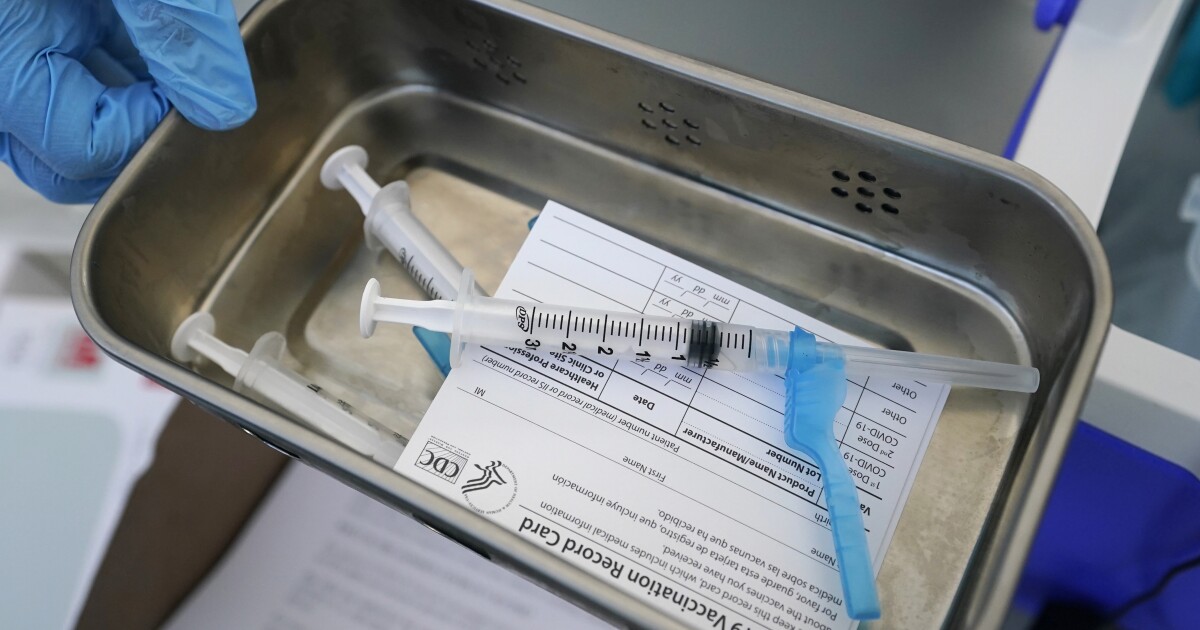As the Delta variant became the dominant strain of coronavirus across the United States, the three COVID-19 vaccines available to Americans lost some of their protective power, and the efficacy of injection among a large group of veterans declined among 35% and 85%, according to a new study.
Researchers examining the records of nearly 800,000 American veterans found that in early March, just as the Delta variant was gaining traction across the country, all three vaccines had roughly the same ability to prevent infections.
But in the next six months, the situation changed radically.
At the end of September, Moderna’s two-dose COVID-19 vaccine, which was 89% effective in March, was only 58%.
The efficacy of the vaccines made by Pfizer and BioNTech, which also used two doses, fell from 87% to 45% in the same period.
Most strikingly, the protective power of Johnson & Johnson’s single-dose vaccine plummeted from 86% to just 13% in those six months.
The results were published Thursday in the journal Science.
All three vaccines held up best in their ability to prevent deaths from COVID-19, but in July – when the Delta variant began to drive a three-month increase in infections and deaths – the effectiveness of the vaccines in that regard also revealed broad differences.
Among veterans 65 and older who received the Moderna vaccine who subsequently developed an “advanced” infection were 76% less likely to die from COVID-19 compared to unvaccinated veterans of the same age .
Older veterans who chose the Pfizer-BioNTech vaccine and later experienced an advanced infection had a 70% lower risk of dying than their non-immunized peers.
And when elderly veterans who received a single injection of J&J vaccine developed an advanced infection, they were 52% less likely to die than their peers who received no injection.
For veterans under 65, the doses of Pfizer-BioNTech and Moderna provided the best protection against a fatal case of COVID-19, at 84% and 82%, respectively. When younger veterans inoculated with the J&J vaccine suffered an outbreak of infection, they had a 73% lower risk of dying from COVID-19 than their non-immunized peers.
Representatives for Johnson & Johnson did not immediately respond to requests to discuss the results of the study.
The Centers for Disease Control and Prevention has recommended booster shots for everyone who was inoculated against COVID-19 at least two months prior.
Boosters are also recommended six months after a second dose of Moderna or Pfizer vaccines for all people 65 years of age and older; those with medical conditions that make them more vulnerable to a severe case of COVID-19; those who live in nursing homes or other group settings; as well as those who live or work in high-risk environments such as hospitals or prisons.
Also, all people with compromised immune systems are advised to get a booster shot if at least 28 days have passed since the vaccine took full effect.
As millions of vaccinated Americans wonder whether they need a booster, the new study offers the most comprehensive comparison to date of how the three vaccines have performed across the country this year.
780,225 veterans of the US military were tracked from February 1 to October 1. About 500,000 of them had been vaccinated, while just under 300,000 had not.
Coming from across the country, they were all served by the unified Veterans Affairs system, which provides healthcare to 2.7% of the American population. Although the group studied was ethnically and racially diverse, the registry the researchers relied on was uniform.
Being veterans, the study population consisted of six times more men than women. And their age was older: about 48% were 65 or older, 29% were between 50 and 64 years old, and 24% were under 50 years old.
Although older veterans were more likely to die than younger ones throughout the study period, decreased vaccine protection against disease and death was seen in both the young and the old.
The study was conducted by a team from the Oakland Institute of Public Health, the San Francisco Veterans Affairs Medical Center, and the University of Texas Health Sciences Center.
Study lead author Dr. Barbara Cohn said that in addition to their comparison of COVID-19 vaccines, the group’s analysis provides “a framework for making informed decisions about primary vaccination, booster shots, and other multiple layers of protection.” That includes mask-wearing mandates, coronavirus testing, and other public health measures aimed at countering the spread of the virus.
According to the authors, strong evidence of declining vaccine power should prompt even states and localities with highly inoculated populations to consider maintaining mask mandates. And the results strongly support the CDC’s recent recommendation that all J&J vaccine recipients receive a booster.
The study concluded that the Delta variant, which caused a wave of infections and deaths across the country this spring and summer, was probably the factor that most impaired vaccine protection.
Other researchers have found similar evidence of decreased effectiveness of vaccines. But they have suggested that the immune system’s defenses against SARS-CoV-2 simply fade over time, and that the decline in vaccine efficacy would likely have been seen with or without the arrival of a new, more transmissible strain.
To read this note in English Click here
–


